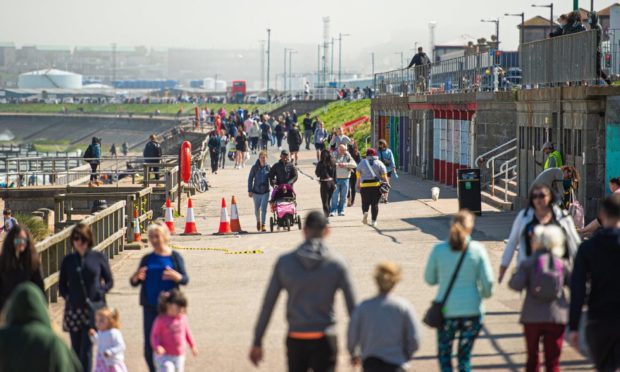NHS Grampian is urging people to continue to be cautious as the north-east prepares to move to Level 1 of the coronavirus restrictions this weekend.
The key message from NHS Grampian Public Health is for people to “stay safe, be sensible” ahead of Aberdeen, Aberdeenshire and Moray moving to Level 1.
Earlier this week First Minister Nicola Sturgeon confirmed that the north and north-east would be moving down to Level 1 as of, Saturday June 5.
She explained that the roll-out of vaccines was allowing for a less restrictive way of dealing with the virus, but cautioned that we are “not quite there yet”.
Speaking at an unscheduled briefing on Friday the first minister asked Scots to “exercise great care” ahead of this weekend’s easing of restrictions, as the ‘delta’ Covid variant drives the possible start of a third wave.
What does this mean for the areas?
Derek Cox, consultant in public health, said: “The move down to Level 1 is, of course, incredibly welcome. We’ve had to cope with so many restrictions on how we live our lives over the last 15 months, that the taste of increased freedoms is irresistible. People in the north-east are renowned for their caution and good sense and I hope these will be on display yet again. Meeting outside, rather than inside, and keeping our social groups smaller are two simple steps we can all take to keep ourselves and others safe.”
He explained that although case numbers in the region are relatively low and there is a very small number of people in hospital we should still be cautious and sensible.
“The fact is, now is absolutely the time for caution – by the time we see rising case numbers and more people in hospital, it becomes so much harder to break the chains of Covid transmission. It’s also a fact that we have seen cases of the ‘delta’ variant of Covid confirmed in Grampian. The numbers are small – for now – but the evidence suggests this version of the virus is highly transmissible, even among those who have been vaccinated.
“The list of things permitted under Level 1 restrictions should be seen as limits, not requirements. Yes, you can have six people, from three households, meeting in a private home – but do you need to? Yes, you can have people staying overnight in your home – but do you need to?”
He encourages residents to test themselves regularly, even if they do not have any symptoms of the virus. Taking a lateral flow device test twice a week will help the NHS find cases quickly and offer the necessary support.
If someone does have symptoms Mr Cox urges that the person books a PCR test instead of using a lateral flow device test to get an accurate result.
Information on the different types of test and how to arrange them is available on the NHS Inform website.
Thinking about travelling?
Tim Allison, director of public health with NHS Highland echoed Mr Cox’s cautions and is asking people to be careful when travelling.
He said: “Travel across the UK is also something we can now enjoy again but I would appeal for caution from anyone who is travelling, particularly if they are going to an area that has a higher number of cases as this risks bringing infection back to our local communities. Is this travel necessary?
“If you do visit areas that have a high rate of infection try to limit your contact with others on your return to limit any potential spread.”
Mr Allison stressed the importance of the vaccination roll-out and is reminding people to come forward for their vaccine when invited.
